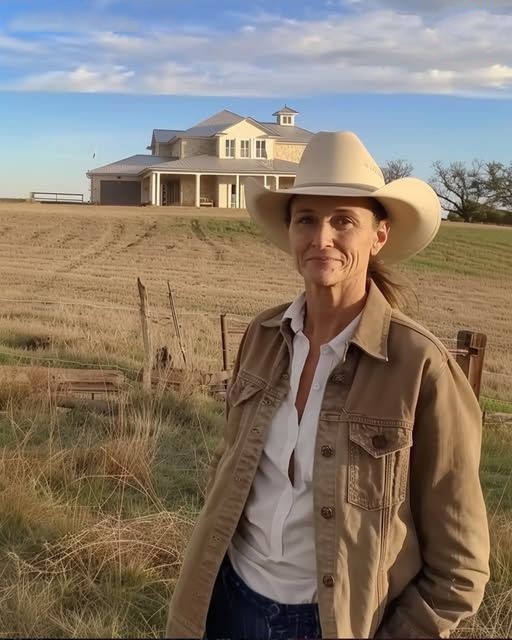I was still grieving when I received the letter from the notary’s office. My father had passed away weeks earlier, leaving behind more questions than comfort. Debt had consumed the home we once shared, and I felt like everything stable in my life had dissolved into fog. So when I heard he’d left me another house—one I’d never known existed—I wasn’t sure if it was a gift or another burden.
Rain slicked the streets as I rushed toward the notary’s office. The musty hallway, the faded portraits on the walls, and the smell of old paper made everything feel heavy. The notary, an older man with a tired voice, asked me to sit. I barely listened until he said the word that caught me off guard: “house.”
My head snapped up. “Did you say… a house?”
“Yes,” he said, sliding a file toward me. “Not the home you were living in. This is another property, registered solely in your father’s name.”
My hands trembled as I took the file. The address meant nothing to me. Why hadn’t he ever mentioned it? Had it been a secret, or a forgotten mistake? I didn’t understand. But something told me I needed to see it for myself.
The next morning, I took the day off and followed a winding road out of town. The trees lining the road had turned gold with fall, like quiet witnesses to whatever lay ahead. When I arrived, I was stunned. The house wasn’t abandoned—it was lived in. The porch was freshly painted, flowers bloomed in boxes, and lace curtains framed the windows. It looked like something out of a storybook.
I clutched the key the notary had given me and approached the front door. But when I tried it, it didn’t fit. My heart sank. Then, without warning, the door flung open.
A stern woman, maybe in her fifties, stood in the doorway. “Can I help you?” she asked, suspicion hard in her voice.
I held up the key. “This house was left to me by my father. I believe it’s mine.”
Her eyes narrowed. “This is my home. I’ve lived here for twenty years. I’ve repaired the roof, paid the bills, kept it standing. Your paperwork doesn’t mean anything to me.”
I tried to stay calm. “I have no idea who you are. But this house—he left it to me.”
She didn’t blink. “I’m not leaving. You want to fight? Fine. But I’m not going anywhere.”
Her name was Deborah. And by some twisted turn of fate, we now shared the same roof.
The days that followed were hell. Deborah rattled pots at midnight, tampered with the water, moved my things out of place—little acts of war designed to break me down. But I didn’t back off. I called my lawyer, who assured me I had a strong claim. Still, I stayed in the house. I wasn’t going to be chased away.
Then, on the day of my court appointment, I discovered my clean white outfit—carefully laid out to air—thrown into the mud. Furious, I stormed into the kitchen, where Deborah calmly sipped tea.
“You did this,” I snapped.
She didn’t flinch. “I have no idea what you’re talking about.”
I slapped the muddy clothes on the table. “Why are you treating me like the enemy?”
That’s when something in her shifted. Her face twisted with pain. “Because this was never supposed to be yours,” she said, her voice trembling. “Your father took everything. He took you. You were mine.”
I froze. “What?”
Tears welled in her eyes as she pulled a small bracelet from her pocket and handed it to me. “I’m your mother.”
My world tilted.
She explained how she had left when I was a baby, chasing a new life that ended in regret. My father had refused to forgive her, and the courts gave him full custody. He cut her out completely. He told me she had died.
“This house,” she said, her voice cracking, “was all I had left. It was where we lived—your father and I—before everything fell apart. He couldn’t return here after what happened, but he kept it. Maybe… maybe to leave it for you. Or maybe to leave it for me.”
I stood there, everything I thought I knew suddenly unrecognizable.
We didn’t talk much after that. We moved through the house like strangers with shared pain. The court date came. The judge ruled in Deborah’s favor—her years of residence, her upkeep, it made her the rightful owner.
I packed quietly. As I slung my bag over my shoulder, Deborah stopped me. “I don’t want you to go,” she said. “You’re my daughter. I made mistakes, but I don’t want to lose you again.”
Her words hit me like a wave. I didn’t know what to say. But I walked forward and hugged her. She hesitated… then wrapped her arms around me.
From that moment, things slowly changed.
We began talking. We sorted through old boxes. We shared stories. We started rebuilding. The house, once a battleground, became a place of healing.
I learned that family is more than paperwork. It’s forgiveness. It’s rebuilding what was broken—even when the pieces don’t quite fit. And sometimes, the home you inherit isn’t built of walls and wood, but of second chances.
Let me know if you want this adapted into video narration or posted on social media—I’d be happy to shape it further.
